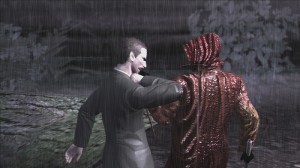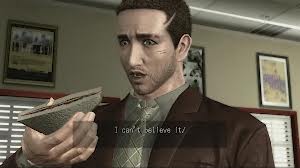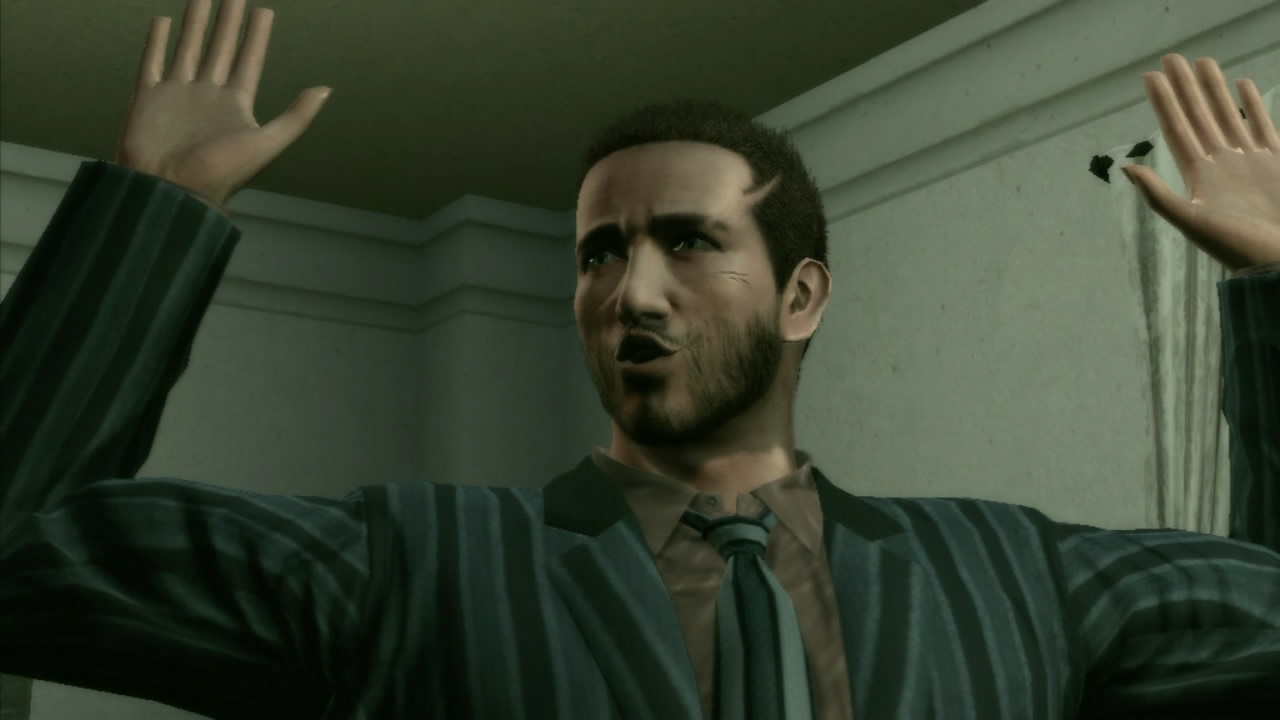 Gordon Lockhart tells us about a very peculiar game.
Gordon Lockhart tells us about a very peculiar game.
This is not how games are meant to be.
We’ve grown so accustomed to the faultless sheen of modern games – to the soulless bombast from generic action titles – that to be presented with something that feels designed from the ground up as the antithesis of such titles feels like a genuine shock – one that makes you question the qualities of a great game. For to dismiss a game based on sub-par graphics, arguably broken controls and production values that vary sharply (between bargain basement and ten floors below said bargain basement level), would mean missing out on one of the most divisive yet strangely compelling gaming experiences of this (or any) generation.
Developed by Access Games and written and directed by Hidetaka ‘SWERY’ Suehiro, Deadly Premonition plays fast and loose with established conventions, not just in terms of gameplay but in terms of tone and characters. Displaying a clear debt to David Lynch’s ‘Twin Peaks’, the complete disregard for the conventions of how games should look and play is often staggering. So how is it possible that something that feels consciously designed to tick all the boxes for what a game shouldn’t be has developed such a passionate following, where even its blatant flaws are heralded as marks of genius? Well, it’s easy: the answer’s in the coffee…
 Most highly trained FBI agents wouldn’t look for clues in their morning coffee, but then Special Agent Francis York Morgan (or, hey, just call him York) isn’t your normal FBI agent – as demonstrated in a frankly baffling scene where York derives key insight into the case by gazing into his morning cup of joe. When your lead character doesn’t so much as run into lunacy but strap himself to a rocket and break the sound barrier while doing so, it’s clear that you’re not witnessing just another protagonist moulded in the image of the muscle-bound, charisma-free heroes found in many a grey and brown-hued action title. Summoned to the town of Greenvale to investigate the ritualistic killing of a young woman, York has a tendency to think and act ‘outside the box’ – a massive understatement to anyone that has played the game. Dismissive, aloof and slightly not all there, what should have been a one joke character turns into, by the time the credits roll, one of the most sympathetic and – with his assortments of ticks and flaws – oddly human characters that players will encounter. Yet, for all of York’s visible quirks, it’s the one thing that you cannot see that has ensured his place in people’s affections, his invisible friend: Zach. Or, should I say, you.
Most highly trained FBI agents wouldn’t look for clues in their morning coffee, but then Special Agent Francis York Morgan (or, hey, just call him York) isn’t your normal FBI agent – as demonstrated in a frankly baffling scene where York derives key insight into the case by gazing into his morning cup of joe. When your lead character doesn’t so much as run into lunacy but strap himself to a rocket and break the sound barrier while doing so, it’s clear that you’re not witnessing just another protagonist moulded in the image of the muscle-bound, charisma-free heroes found in many a grey and brown-hued action title. Summoned to the town of Greenvale to investigate the ritualistic killing of a young woman, York has a tendency to think and act ‘outside the box’ – a massive understatement to anyone that has played the game. Dismissive, aloof and slightly not all there, what should have been a one joke character turns into, by the time the credits roll, one of the most sympathetic and – with his assortments of ticks and flaws – oddly human characters that players will encounter. Yet, for all of York’s visible quirks, it’s the one thing that you cannot see that has ensured his place in people’s affections, his invisible friend: Zach. Or, should I say, you.
Much to the puzzlement of the local law enforcement, York constantly confides and talks openly with an unseen character known as Zach. Whether it’s on matters related to the case, the early work of film director Richard Donner, or the lack of DVD special features on movies from the 80’s, the sheer variety and oddness of the (one way) conversations are more entertaining and surprisingly endearing than any amount of forced and contrived dialogue. However, it is these purposefully bizarre conversations that are the key to creating the real emotional connection between player and character. The inspired twist is that you and I, the player, are Zach. Freely discussing clues vital to the case or his thoughts on the unexpected number of attractive women in town. The result is that there is a genuine liking for the character – one where the player takes a vested interest in his safety. The cleverness of this bond is, sneakily, the developers have convinced you to persevere through every awkward combat section, every overlong drive between locations and every insane dream sequences. These dream sequences are so clearly lifted from Lynch’s ‘Twin Peaks’ that they might as well have an introduction by the great man himself saying, “ I approve this dream sequence.” When even traditionally boring car journeys are made memorable experiences you begin to truly appreciate this inspired touch.
 Over the course of 20+ hours (genuine longevity being another surprise considering its budget price), the game consistently defies your expectations. In a world of mega-budget “blockbuster” games, surely such a ‘cheap’ game will short change you? Wrong. Swery and his team offer you a living, breathing town, populated with a myriad of fascinating characters who are seen to go about their daily lives – eating at the local diner, drinking at the local bar or just staying at home – rather than just summoned into existence whenever the story dictates, as would be the case in such larger games as Grand Theft Auto. Stretching far beyond what you would expect, the game constantly gives you more than it has any reason to, as evidenced in one section where you have the freedom to wander an entire hospital, to explore freely, where there are entire floors existing that have no need to be there. They contain nothing relevant to the main story, yet the developers have quite clearly dedicated resources to create comprehensive sections of the game world that 95% of players won’t even bother discovering – something that makes the game stand out all the more.
Over the course of 20+ hours (genuine longevity being another surprise considering its budget price), the game consistently defies your expectations. In a world of mega-budget “blockbuster” games, surely such a ‘cheap’ game will short change you? Wrong. Swery and his team offer you a living, breathing town, populated with a myriad of fascinating characters who are seen to go about their daily lives – eating at the local diner, drinking at the local bar or just staying at home – rather than just summoned into existence whenever the story dictates, as would be the case in such larger games as Grand Theft Auto. Stretching far beyond what you would expect, the game constantly gives you more than it has any reason to, as evidenced in one section where you have the freedom to wander an entire hospital, to explore freely, where there are entire floors existing that have no need to be there. They contain nothing relevant to the main story, yet the developers have quite clearly dedicated resources to create comprehensive sections of the game world that 95% of players won’t even bother discovering – something that makes the game stand out all the more.
The game is rife with such surprises. There is lively debate between fans as to whether the game was developed with all the idiosyncratic ‘tics’ on purpose – almost as an inside joke on the medium. Here is a game that almost revels in defying gaming conventions. Helpful map? Easy to read? No chance. The thing might as well be spinning in circles for all the help it offers. Lush symphonic score? Well if listening to the same 3 or 4 tracks repeated throughout sounds better than an evening listening to the work of John Williams then you’re going to be over the moon with this. What’s even more staggering is the decision to almost always play these 3 or 4 tracks at the most inappropriate times. One particular moment sees York regaling his colleagues with tales of a past case, a Ted Bundy-like serial killer who takes the skulls of his victims and uses them for, well, ‘stuff’. Judging by the sickened expressions of those listening, it would be safe to assume that this is one particularly unsettling story. However, with the sudden introduction of the most incongruous jazz accompaniments ever heard, contrasting the horrific nature of York’s story with the most cheery and upbeat tune this side of a Radio 2 chill out session, the sequence achieves a level of surrealism that would make Salvadore Dali proud. It really is a remarkable game for the simple reason that it exists at all.
 Time and time again with this game there is the feeling of a Japanese studio trying to emulate (or mimic) the conventions of current, popular western-made titles. Of someone trying to distil the essence of these multi-million selling games, yet somehow not quite grasping just what it is that makes them so successful. For all that, anyone who has fallen in love with the adventures of Special Agent Francis York Morgan and his silent guardian, Zach, know that they wouldn’t have it any other way. In a game full of surprises, one sequence later in the game will quite literally leave your jaw on the floor (fans will know EXACTLY what I’m talking about…), you’re left hoping that nothing in the game was deliberate, that Swery and his team stumbled across some form of magical gaming alchemy, one that can never be repeated – because if such a gem like Deadly Premonition can simply be manufactured, then it would take away the uniqueness of the experience. It’s obviously up to the players to debate this but I know where I stand.
Time and time again with this game there is the feeling of a Japanese studio trying to emulate (or mimic) the conventions of current, popular western-made titles. Of someone trying to distil the essence of these multi-million selling games, yet somehow not quite grasping just what it is that makes them so successful. For all that, anyone who has fallen in love with the adventures of Special Agent Francis York Morgan and his silent guardian, Zach, know that they wouldn’t have it any other way. In a game full of surprises, one sequence later in the game will quite literally leave your jaw on the floor (fans will know EXACTLY what I’m talking about…), you’re left hoping that nothing in the game was deliberate, that Swery and his team stumbled across some form of magical gaming alchemy, one that can never be repeated – because if such a gem like Deadly Premonition can simply be manufactured, then it would take away the uniqueness of the experience. It’s obviously up to the players to debate this but I know where I stand.
What do you think, Zach?
